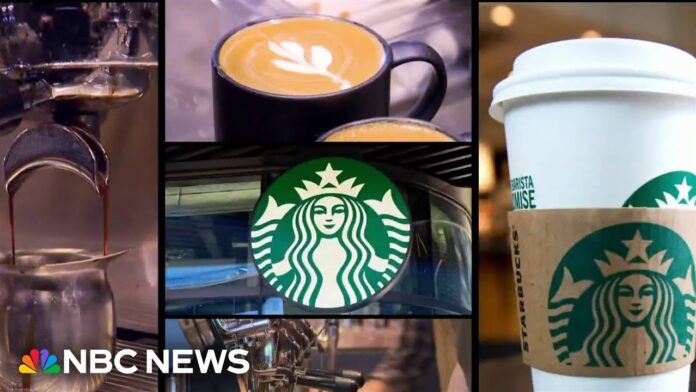Starbucks announces leadership change as chief executive Laxman Narasimhan steps down and Chipotle’s Brian Niccol is named as the new CEO, amid a challenging period for the coffee chain.
Starbucks has announced a major leadership change as the company grapples with declining sales and ongoing controversies. Laxman Narasimhan, who has served as CEO for less than two years, is stepping down from his position. Brian Niccol, the current CEO of Chipotle, will take over the role, marking a significant shift for the coffee giant.
Narasimhan’s departure comes as Starbucks faces a challenging period marked by a slump in sales. The company’s global sales fell by 3% in the three months ending in June, driven by weaknesses in the US and China markets. The decline follows criticism over rising prices, long wait times for drinks, and a backlash related to the Israel-Gaza conflict. The company’s response to the conflict, including a lawsuit against a union expressing solidarity with Palestinians, has spurred international boycotts and added to the brand’s troubles.
Howard Schultz, the former CEO who played a key role in Starbucks’ expansion into a global powerhouse, expressed his support for Niccol, describing him as the right leader for the company at this crucial time. “He has my respect and full support,” Schultz said. The announcement of Niccol’s appointment led to a notable increase in Starbucks’ shares, which jumped more than 20%.
Niccol, who has led Chipotle since 2018, is credited with revitalizing the brand following food poisoning outbreaks that had severely impacted the company. Under his leadership, Chipotle’s sales doubled, and its share price surged from under $7 to over $50. Niccol also introduced innovative technologies like robotic grills and automated processors, significantly enhancing operational efficiency.
Despite his successes at Chipotle, Niccol faces a tougher challenge at Starbucks, according to analysts. Sharon Zackfia of William Blair noted that Starbucks’ issues are more complex than those Niccol dealt with at Chipotle. “While we cannot help but be more optimistic on today’s news, we suspect the path to recapturing lost sales will be less linear,” Zackfia said. Starbucks must address multiple problems, including boycott pressures, perceived value issues, and service delays, which were not present at Chipotle.
Narasimhan’s appointment in 2022 followed a long tenure by Schultz, and although he was seen as a promising choice, his tenure was marked by growing concerns about the company’s direction. Starbucks’ expansion in the post-pandemic era was overshadowed by internal conflicts, including a high-profile unionization campaign and controversies surrounding its stance on global issues.
As Starbucks transitions to new leadership, Niccol will need to navigate these challenges and restore growth. The company’s ongoing difficulties reflect broader issues within the restaurant industry, where many businesses are struggling with reduced consumer spending and operational inefficiencies.
Analysis:
Political:
The leadership change at Starbucks highlights broader political and regulatory challenges facing multinational companies. The controversy over Starbucks’ stance on the Israel-Gaza conflict and its legal battles with unions reflect how global companies are increasingly drawn into political and social debates. Niccol’s task will involve managing these sensitive issues while addressing regulatory pressures and public scrutiny.
Social:
Starbucks’ recent troubles mirror broader societal issues related to corporate responsibility and consumer expectations. The backlash over price hikes and long wait times underscores growing consumer frustration with big corporations. Additionally, the company’s entanglement in geopolitical conflicts and internal labor disputes points to a broader trend where companies are held accountable for their social and political stances.
Racial:
The company’s involvement in international conflicts and its legal actions against unions intersect with discussions on racial and social justice. Starbucks’ global presence means its policies and actions are scrutinized through various cultural and racial lenses. The company’s response to global issues must consider the diverse perspectives and potential impacts on its global customer base.
Gender:
The leadership change does not directly address gender issues, but Niccol’s appointment could influence gender dynamics within the company. Historically, leadership roles in large corporations have struggled with gender diversity. As Niccol takes over, his approach to management and corporate culture could affect ongoing discussions about gender equality and representation within Starbucks and the broader industry.
Economic:
The economic implications of Starbucks’ leadership change are significant. The company’s recent sales slump and operational challenges reflect broader economic trends affecting the restaurant and retail sectors. Niccol’s success in revitalizing Chipotle provides hope for Starbucks, but the complexities of its current issues suggest that economic recovery will require careful strategy and execution.
